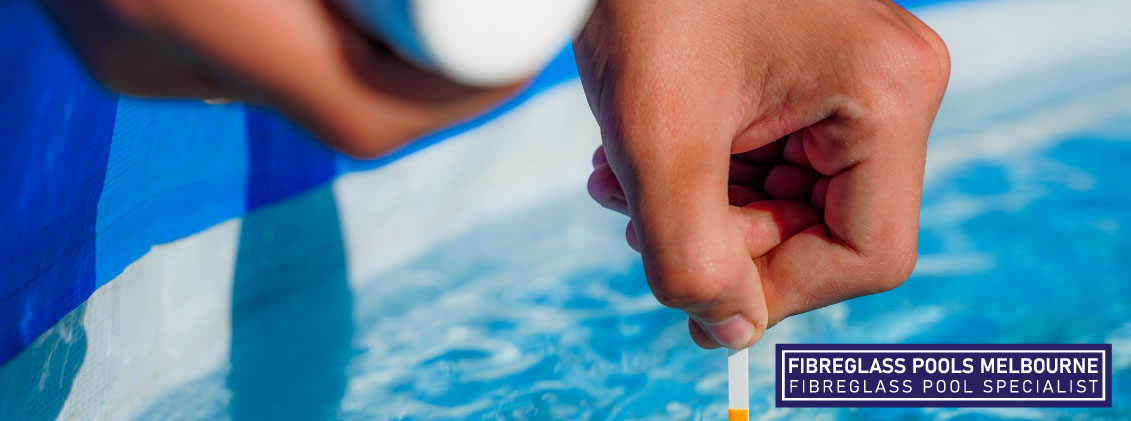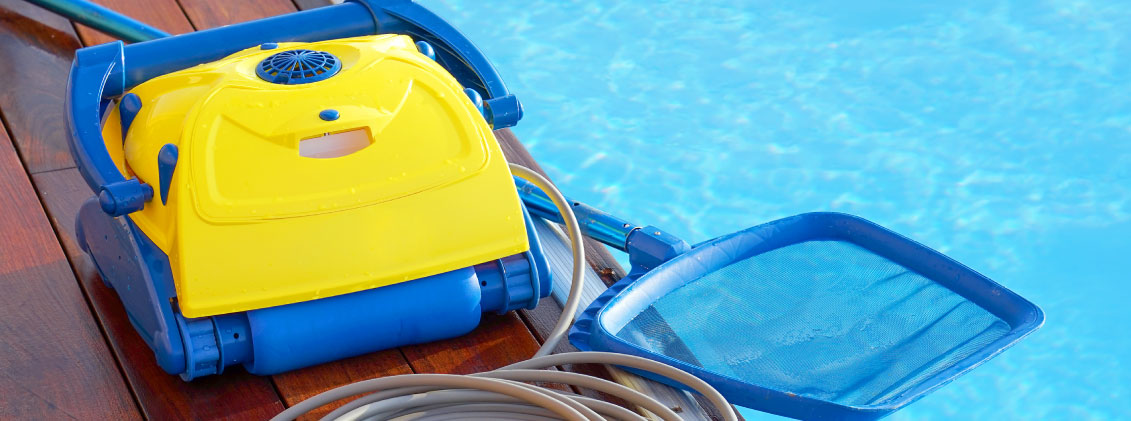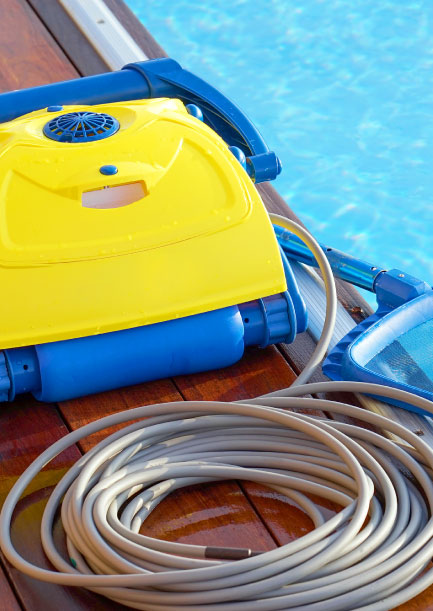Maintain Your Fibreglass Pool With These Tips
Maintaining your fibreglass swimming pool can initially appear overwhelming, but with the right approach, it becomes a manageable and rewarding task. A properly cared for pool not only exudes beauty but also ensures safety and enhances your overall swimming experience.

What Can You Do?
In this guide, we offer some essential tips on fibreglass pool maintenance that will help you keep your pool in pristine condition, ensuring it remains sparkling clean and inviting for you and your loved ones to enjoy throughout the year. From water chemistry management to regular cleaning routines, our comprehensive advice covers all aspects of keeping your fibreglass pool in top-notch shape. Get ready to dive into a worry-free pool ownership experience that guarantees endless hours of relaxation and fun!
Regular Cleaning
Regular cleaning is the cornerstone of swimming pool maintenance. Use a long-handled net or leaf skimmer to remove leaves, insects, and other debris from the water surface. Additionally, a pool vacuum can be used to clean the bottom of the pool, removing any dirt or algae that may have accumulated.
Check and Adjust Chemical Levels
Maintaining the right chemical balance in your pool is crucial to prevent the growth of bacteria and algae. Check the pH levels, alkalinity, and sanitiser levels regularly, adjusting as necessary. A healthy fibreglass pool should have a pH level between 7.2 and 7.6.
Brush and Rinse
Even though fibreglass pools are relatively resistant to algae, occasional brushing and rinsing of the pool surface are necessary. Use a brush specifically designed for fibreglass pools to avoid scratching the surface.
Inspect the Pool Filter
The pool filter plays a crucial role in maintaining the cleanliness and clarity of your pool. It acts as a guardian, diligently working to keep your pool water pristine. Regularly checking and cleaning the filter is vital to ensure its optimal performance. By doing so, you can rest assured that any small debris that may have escaped the skimming process will be efficiently removed, leaving your pool sparkling and inviting.
Monitor Water Levels
Keeping a constant eye on your pool’s water level is important. Too much or too little water can cause problems. If the water level gets too low, the pump could get damaged. If it’s too high, the skimmer door may not work correctly.

Regular Maintenance Checks
Regular maintenance checks are absolutely crucial for ensuring the long-lasting durability of your fibreglass pool. It is important to closely monitor key aspects, including the condition of the pool shell for any visible damage, such as cracks or chips that may compromise its integrity. Additionally, pay attention to the pump and filtration system, listening for any abnormal noises or signs of leaks that could indicate a potential issue. Lastly, inspect the pool cover thoroughly, checking for any rips, tears, or signs of wear that might require prompt attention. By regularly attending to these details, you can ensure that your fibreglass pool remains in optimal condition for years to come.
Winterising Your Pool
As the colder months approach, it’s essential to prepare your fibreglass pool for winter. This process, known as winterising, involves adding winter chemicals to prevent algae growth while the pool is not in use, and covering the pool to protect it from debris and harsh weather.
Regularly Check Pool Equipment
Regularly inspecting your pool’s equipment like pumps, heaters, and lighting systems can help identify any potential issues early. Look for signs of wear and tear, leaks, or any changes in performance. If you encounter any problems, it’s best to consult with a pool professional to address them promptly.
Pool Shock Treatment
Consider giving your pool a shock treatment once a week during peak usage and every two weeks during off-peak times. This process involves ‘super-chlorinating’ your pool to kill bacteria and contaminants that can affect the clarity and quality of the water.
Pool Safety
Always ensure safety measures are in place. This includes having a fence around the pool with a self-locking gate, implementing rules for pool use, keeping lifesaving equipment nearby, and regularly checking the pool area for potential hazards.
Limit the Use of Sunscreen and Lotions
While sunscreen and lotions are essential for skin protection, they can significantly contribute to the oil and grease buildup in your pool. Encourage your swimmers to shower before entering the pool to reduce the amount of sunscreen and lotions in the water.

Regularly Empty the Skimmer Baskets
The skimmer baskets collect large pieces of debris such as leaves and insects. Over time, they can become full and lose their effectiveness. Regularly emptying and cleaning these baskets will keep your pool cleaner and maintain the efficiency of your skimming system.
Use a Pool Cover
When the pool is not in use, especially in the off-season, use a cover to protect it from debris and the elements. A covered pool will require less cleaning and chemical balancing, thus reducing maintenance time and costs.
Keep an Eye on the Weather
Weather conditions can greatly affect your pool’s water balance. Intense sunlight can reduce chlorine levels, while heavy rain can dilute your pool chemicals and alter the water balance. Monitor the weather and adjust your maintenance routine accordingly.
Hire a Professional
While regular DIY maintenance, such as cleaning and water testing, is crucial for keeping your pool in great shape, it is also important to consider hiring a professional for an annual check-up. By doing so, you can ensure that any hidden issues or potential problems are identified and addressed before they escalate into more serious and costly issues. Additionally, professionals can provide valuable insights and tailored tips based on your specific pool type and situation, helping you optimise its performance and longevity.
Conclusion
In conclusion, regular and meticulous maintenance of your fibreglass pool is crucial to ensure its long-lasting durability and captivating beauty. By following these essential maintenance tips, such as regularly monitoring the water chemistry, brushing the pool walls, and cleaning the filter system, you can enhance the longevity of your pool and provide endless opportunities for fun and relaxation for you and your family. Take the time to enjoy a hassle-free pool experience, knowing that your well-maintained pool will be ready for countless hours of happy swimming!
Maintain Your Fibreglass Pool With These Tips
Maintaining your fibreglass swimming pool can initially appear overwhelming, but with the right approach, it becomes a manageable and rewarding task. A properly cared for pool not only exudes beauty but also ensures safety and enhances your overall swimming experience.

What Can You Do?
In this guide, we offer some essential tips on fibreglass pool maintenance that will help you keep your pool in pristine condition, ensuring it remains sparkling clean and inviting for you and your loved ones to enjoy throughout the year. From water chemistry management to regular cleaning routines, our comprehensive advice covers all aspects of keeping your fibreglass pool in top-notch shape. Get ready to dive into a worry-free pool ownership experience that guarantees endless hours of relaxation and fun!
Regular Cleaning
Regular cleaning is the cornerstone of swimming pool maintenance. Use a long-handled net or leaf skimmer to remove leaves, insects, and other debris from the water surface. Additionally, a pool vacuum can be used to clean the bottom of the pool, removing any dirt or algae that may have accumulated.
Check and Adjust Chemical Levels
Maintaining the right chemical balance in your pool is crucial to prevent the growth of bacteria and algae. Check the pH levels, alkalinity, and sanitiser levels regularly, adjusting as necessary. A healthy fibreglass pool should have a pH level between 7.2 and 7.6.
Brush and Rinse
Even though fibreglass pools are relatively resistant to algae, occasional brushing and rinsing of the pool surface are necessary. Use a brush specifically designed for fibreglass pools to avoid scratching the surface.
Inspect the Pool Filter
The pool filter plays a crucial role in maintaining the cleanliness and clarity of your pool. It acts as a guardian, diligently working to keep your pool water pristine. Regularly checking and cleaning the filter is vital to ensure its optimal performance. By doing so, you can rest assured that any small debris that may have escaped the skimming process will be efficiently removed, leaving your pool sparkling and inviting.
Monitor Water Levels
Keeping a constant eye on your pool’s water level is important. Too much or too little water can cause problems. If the water level gets too low, the pump could get damaged. If it’s too high, the skimmer door may not work correctly.

Regular Maintenance Checks
Regular maintenance checks are absolutely crucial for ensuring the long-lasting durability of your fibreglass pool. It is important to closely monitor key aspects, including the condition of the pool shell for any visible damage, such as cracks or chips that may compromise its integrity. Additionally, pay attention to the pump and filtration system, listening for any abnormal noises or signs of leaks that could indicate a potential issue. Lastly, inspect the pool cover thoroughly, checking for any rips, tears, or signs of wear that might require prompt attention. By regularly attending to these details, you can ensure that your fibreglass pool remains in optimal condition for years to come.
Winterising Your Pool
As the colder months approach, it’s essential to prepare your fibreglass pool for winter. This process, known as winterising, involves adding winter chemicals to prevent algae growth while the pool is not in use, and covering the pool to protect it from debris and harsh weather.
Regularly Check Pool Equipment
Regularly inspecting your pool’s equipment like pumps, heaters, and lighting systems can help identify any potential issues early. Look for signs of wear and tear, leaks, or any changes in performance. If you encounter any problems, it’s best to consult with a pool professional to address them promptly.
Pool Shock Treatment
Consider giving your pool a shock treatment once a week during peak usage and every two weeks during off-peak times. This process involves ‘super-chlorinating’ your pool to kill bacteria and contaminants that can affect the clarity and quality of the water.
Pool Safety
Always ensure safety measures are in place. This includes having a fence around the pool with a self-locking gate, implementing rules for pool use, keeping lifesaving equipment nearby, and regularly checking the pool area for potential hazards.
Limit the Use of Sunscreen and Lotions
While sunscreen and lotions are essential for skin protection, they can significantly contribute to the oil and grease buildup in your pool. Encourage your swimmers to shower before entering the pool to reduce the amount of sunscreen and lotions in the water.

Regularly Empty the Skimmer Baskets
The skimmer baskets collect large pieces of debris such as leaves and insects. Over time, they can become full and lose their effectiveness. Regularly emptying and cleaning these baskets will keep your pool cleaner and maintain the efficiency of your skimming system.
Use a Pool Cover
When the pool is not in use, especially in the off-season, use a cover to protect it from debris and the elements. A covered pool will require less cleaning and chemical balancing, thus reducing maintenance time and costs.
Keep an Eye on the Weather
Weather conditions can greatly affect your pool’s water balance. Intense sunlight can reduce chlorine levels, while heavy rain can dilute your pool chemicals and alter the water balance. Monitor the weather and adjust your maintenance routine accordingly.
Hire a Professional
While regular DIY maintenance, such as cleaning and water testing, is crucial for keeping your pool in great shape, it is also important to consider hiring a professional for an annual check-up. By doing so, you can ensure that any hidden issues or potential problems are identified and addressed before they escalate into more serious and costly issues. Additionally, professionals can provide valuable insights and tailored tips based on your specific pool type and situation, helping you optimise its performance and longevity.
Conclusion
In conclusion, regular and meticulous maintenance of your fibreglass pool is crucial to ensure its long-lasting durability and captivating beauty. By following these essential maintenance tips, such as regularly monitoring the water chemistry, brushing the pool walls, and cleaning the filter system, you can enhance the longevity of your pool and provide endless opportunities for fun and relaxation for you and your family. Take the time to enjoy a hassle-free pool experience, knowing that your well-maintained pool will be ready for countless hours of happy swimming!


